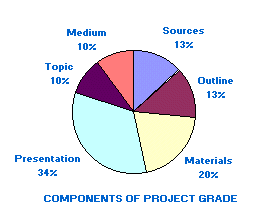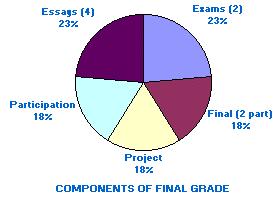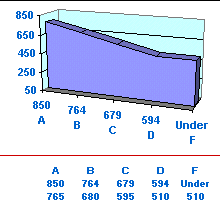 |
|
|
|
|
|
|
WESTERN
CIVILIZATION 1003
READING MATERIALS
Text: Mortimer Chambers, et al, The Western
Experience, Volume I, 7th Edition.
Primary Sources: As assigned. Available online.
Class Notes: Available at https://members.tripod.com/wc1003
INSTRUCTOR
Dr. Edrene S. Montgomery, Associate Faculty, NorthWest Arkansas Community College,
Bentonville, Arkansas. Email address: esmnet@earthlink.net
Telephone: (501) 855-6836
Students are expected to attend
all class meetings (absences should be reserved for emergencies), to complete all reading
assignments, and to participate in class discussions. They are required to write four
essays interpreting primary source materials, to complete a semester project presenting
historical evidence in a medium of their choice, and to take two regular examinations and
one comprehensive final examination at the designated times.
See policies regarding attendance, participation, essay acceptance, examinations, and make-ups.
- To understand the approach to history defined by Will and Ariel Durant in The
Lessons of History (1968): "Obviously historiography [writing history]
cannot be a science. It can only be an industry, an art, and a philosophy. – an
industry by ferreting out the facts, an art by establishing a meaningful order in the
chaos of materials, a philosophy by seeking perspective and enlightenment."

- To gain experience in these aspects of the historian’s craft: the discovery,
analysis, interpretation, and communication of historical evidence.

- To understand the major themes and trends of Western Civilization, to appreciate the
contributions made by significant historical figures, and to recognize our common heritage
as members of the human race.

- To develop the skills of critical thinking (analysis, synthesis, evaluation),
communication (listening, reading, writing, speaking) and lifelong learning (curiosity,
initiative, openness, research).
The following course materials
will be available to students online at this web site: https://members.tripod.com/wc1003
 | Syllabus
|
 | Policies
|
 | Calendar
|
 | Details
about assignments (essays and projects) and exams
|
 | Class
notes which correspond to lecture topics on the calendar
|
Students are responsible for:
 | Reviewing
the syllabus, policies, and calendar at the beginning of the semester. (Handouts
will be distributed the first day of class.)

|
 | Bringing
to class meetings copies of the class notes that correspond to that day's lecture
topic. These notes contain summaries, additional online resources, and discussion
questions which will be used in class that day.
Note: I would like the opportunity to modify class notes as late as one
week before the topic will be considered in class. Unfinished notes will display an
"At Work" sign at the top of the page. 
To insure that you have the complete document, you will need to wait until the sign has
been removed from the page.

|
 | Bringing
to class meetings copies of other materials from the web site when instructed.
|
As students work on their projects
throughout the semester, it would be helpful to communicate with them via email about
suggested topics, primary and secondary sources, outlines, etc.. A web-based email
account, which is accessible from any location, would be very useful in that regard. If
students do not already have such an account, they should consider opening one at the
beginning of the semester. For additional information, see How
to Open a Yahoo! Email Account
There will be two regular examinations (100-pts ea.) covering lectures,
class discussions, and assigned readings.
|
|
|
- In addition, there will be five essays (50-pts ea.) covering primary source reading
materials. Students will be permitted to drop the score from one of these essays at the
end of the course. Essays should be 2-3 double-spaced pages in length (500-750 words) and
must be typewritten. They will be accepted on or before the due date, but not after.
|

|
- The final examination (150-pts) will be comprehensive.

- All examinations will be of the essay variety. Examinations and essays will be graded on
the basis of content (80%), presentation (10%), and mechanics (10%).

|
- In addition, students will complete a semester project (150-pts) in which they present
historical evidence in the medium of their choice. (For example, an essay, a work of art,
a dramatic presentation, a multimedia computer presentation, an interpretive dance, a
debate, a slide presentation, a short story, a film, etc.).

|

|
Projects will be graded on the significance of the topic (15-pts), the selection of
primary and secondary sources (20-pts), the choice of a medium (15-pts), an outline of the
proposed content (20-pts), the quality of the class presentation (50-pts),and the quality
of the accompanying materials (30-pts). These materials should include a written report
(explaining the project’s features and indicating the sources used to create it) and
an IBM computer diskette (containing a 100-word-or-less abstract, a list of the most
relevant Web sites related to the topic, two or three graphics files, and a MIDI or WAV
sound related to the project).

|
- Finally, it will be possible for students to earn 150-pts for participation in class
discussions. Points will be awarded for significant contributions to the group's learning
experience (e.g., a question, an astute observation, or a reaction to historical fact
which stimulates a worthwhile discussion; a synopsis of an online
resource which increases the group's knowledge of the topic under
consideration; an account of a research experience which contributes to the group's
understanding of the historiographical process (discovery, analysis, interpretation, and
communication of primary sources).

- Final grades will be based on the following scale: A=850-765, B=764-680, C=679-595,
D=594-510, F=Below 510.
|
|

|

|
|
|
|
|
|
|

![]()